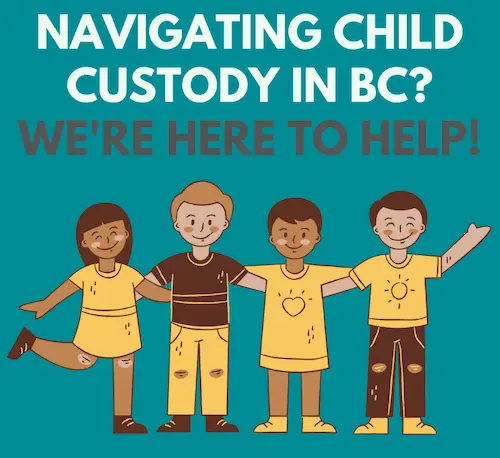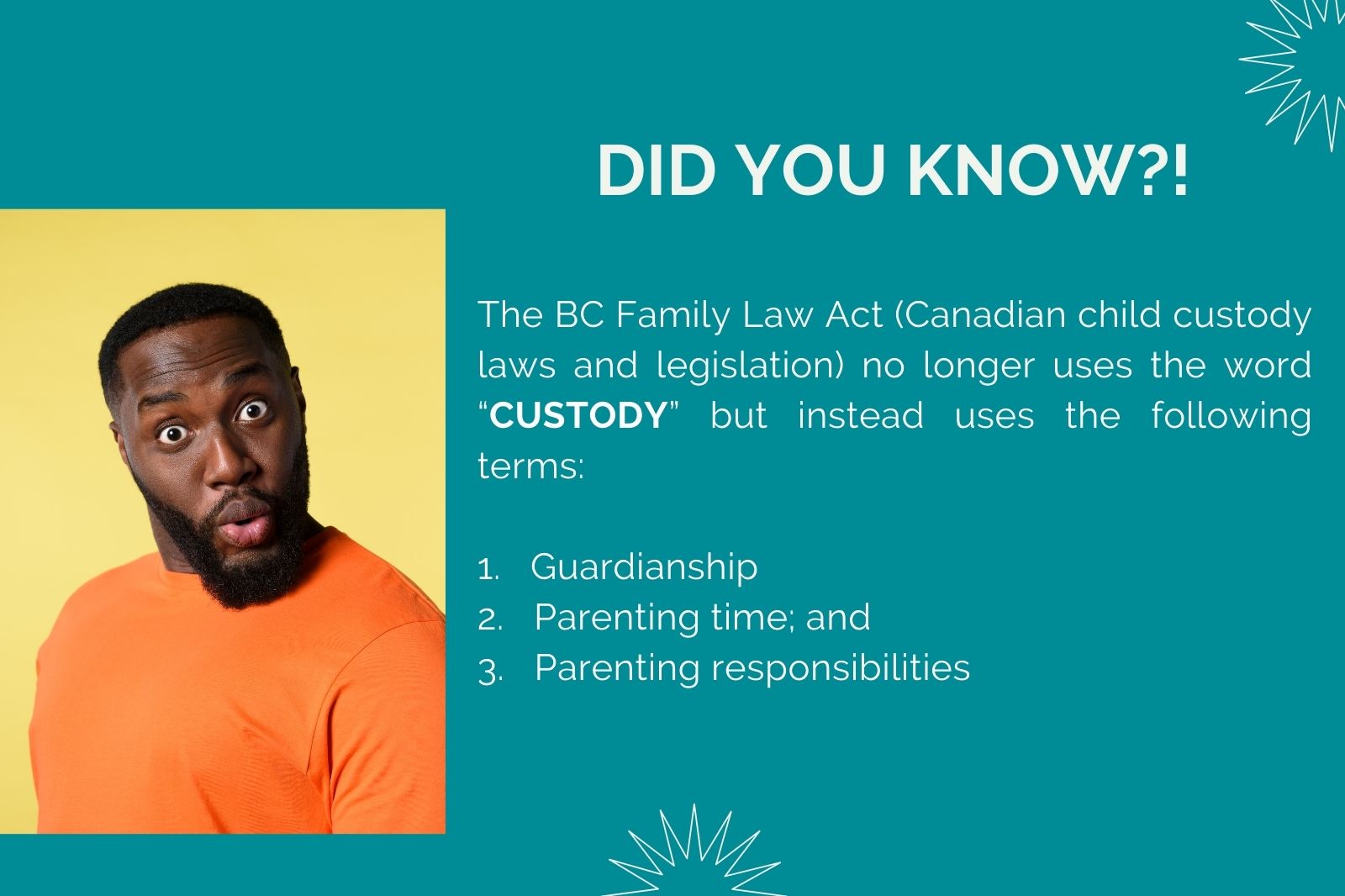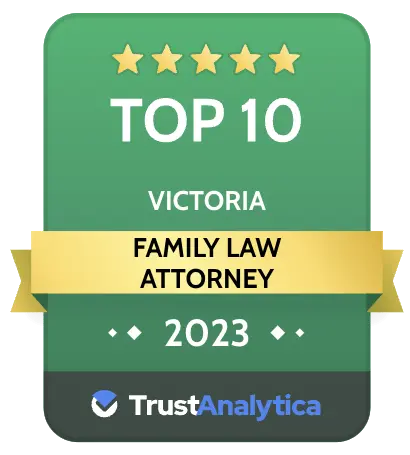Discover more. If your divorce is inevitable, choose the BETTER Path: join our newsletter for supportive, resolution-focused information!

Getting Custody of a Child in BC
- Home
- Getting Custody
People often come to Pathway Legal and ask about getting custody of a child. However, when people want to obtain sole custody vs joint custody of their children, it is often based upon a bit of a misunderstanding.
Consider this question:
Do you know what getting custody of a child, means? Let us start with answering two questions about the different types of custody:
- What does sole custody mean? (in other words, what does full custody mean)?
- What does joint custody mean?
Quick Links
What does sole custody mean?
Basically, in BC, sole custody refers to a legal arrangement that was either obtained by a written agreement between the parents or a court order.
When a parent has sole custody that parent has exclusive legal decision-making authority and exclusive responsibility for parenting the child.
This means the parent with sole custody has the exclusive decision-making authority.
Most parents do not agree to allow the other parent to have sole custody, so most of the time, when getting custody of a child, it is done by court order. A judge orders it. However, a judge orders it only in certain and relatively unusual circumstances.
GETTING CUSTODY OF A CHILD - IF YOU WANT A DEEPER DIVE:
What Are the Responsibilities of a Parent With Sole Custody?
When getting custody of a child, the parent with sole custody will have the sole right to make decisions about their child or children regarding:

- Where the child will live
- Day to day decisions
- Day to day care, control and supervision of the child
- With whom the child will associate
- Their education
- Their extra-curricular activities
- Whether or not they'll be raised in a religious faith and what type of faith
- Medical decisions
- Applying for a passport
- Receiving and responding to notices regarding a child
When a court awards sole custody to one parent instead of joint custody, it is believed to be in the child’s best interest. Even if a court awards sole custody to one parent the court most often awards at least some parenting time to the parent that no longer has custody.

Fun fact: Canadian child custody laws i.e. The BC Family Law Act does not refer to the word “Custody” anymore, but instead refers to a parenting plan which includes:
✅ Parenting Responsibilities
✅ Parenting time
Also, under the BC Family Law Act, there is a focus on the best interests of the child, and the responsibilities of parents, but virtually no mention of mother’s rights or Dad’s rights.
Legal custody vs physical custody
The point is that custody refers to decision-making authority more than it means the physical care of a child. Child custody schedules vary from family to family. However when a parent has sole custody vs joint custody they will more likely than not have more parenting time than the other parent.
At Pathway Legal, when assisting a parent with getting custody of a child in BC, we prefer to use mediation for child custody. We believe this to be a helpful and useful process even if the parties have fundamental different views as to what is in the best interest of their children.
Getting custody of a child in BC: Case Study; Elmo, Elsa and the lawyers
In a case we had at our law firm recently, we were dealing with two parents who had diametrically opposed ideas as to what was in the best interest of their two children. We will call the Dad Elmo, and the Mom, Elsa.
Elsa and Elmo have two children. A boy, we will call him Damien of seven and a girl, we will call her Buttercup, of four. The one thing that Elmo and Elsa could agree upon was that Damien was a handful. He had behavioural challenges that included him climbing all over the table at dinner time, breaking things, screaming, and being sent home from school. Buttercup, all agreed, was a very pleasant young person and easy-going.
Elsa was the kind of parent that believed that disciplining children was equal to being abusive. Elmo, on the other hand, believed that their children, and Damien in particular, needed to have boundaries, and expectations.
Elmo thought Elsa was a terrible parent. Elsa thought Elmo was a terrible parent.
Elmo and Elsa each hired lawyers for child custody. Elmo hired our family law firm, and Elsa hired another law firm. Each of them came to their lawyers wanting to know the best evidence for child custody they would need so they could accomplish their goal of sole custody vs. joint custody. Each of them believed they were the better parent. Elsa not only wanted to have sole custody in terms of decision-making, she also believed she should have sole physical custody of Damien and Buttercup.

Both Elma and Elsa, when their lawyers first met with them, were 100% focused on finding out what they needed for their best evidence for child custody.
Here is the magical part. We were able to reach a child custody agreement without court.
Elmo and Elsa agreed to attend mediation for child custody and resolved everything! How did they manage that you ask? The parties (and their lawyers, if we may say so ourselves) got really creative.
Because Elmo and Elsa really believed in doing what is best for Damien and Buttercup, they hired a parenting expert. So, rather than fight about sole custody v. joint custody or getting custody of a child, they focused on what was working and what would work going forward for their kids.
They were able to agree upon a 60-40 custody schedule at first, but then have agreed to move into a 50-50 custody schedule once they meet with the parenting expert.
Talking to children about divorce
Deciding to separate and divorce is not easy. Talking to your kids about it can be even harder. The thing we always tell our clients is that the studies prove that children get over the fact of their parent’s separation and divorce, at least after an initial bumpy time. Kids get over it and adjust as long as the parents are able to handle the process properly and keep their kids out of conflict. Keeping kids out of conflict starts from your very first conversation with them about your divorce.
Best evidence for child custody
As we said, getting custody of a child in British Columbia is a big deal. The BC Family Law Act’s focus is on having both parents involved with their kids. At the same time, the child’s best interests are the only concern. So, if shared parenting is not in your child’s best interest, you have to have the evidence to convince a judge, mediator, lawyer, or arbitrator as to why. Getting sole custody of a child is not easy, and you must have very good reasons. If your kids are in an unfortunate situation where you need to have primary parenting and decision-making in order to keep them safe, discover more about the best evidence you will need.
In British Columbia, the Family Law Act, assumes that children have a right to be raised by both of their parents, that is, that children get to spend time with both of their parents, and that both of their parents can make decisions about them. So, what does joint custody mean in BC?
What does joint custody mean in BC?
Joint custody means that both parents share parenting responsibilities, that is, decision making authority in relation to their children.
Although joint custody often comes with parties sharing parenting time as well, this is not always the case. Child custody schedules depend significantly upon what is in a child’s best interest. Of course, a lot of the time parents differ significantly as to their opinion as to what is in the best interests of their children.
At our family law firm, we have helped many parents come up with all kinds of child custody schedules by age. When we are referring to child custody schedules, we really mean we are talking about the parenting time the child gets to spend with each of their parents.
Some parents choose a 2-2-3 custody schedule (that is the parenting time they spend with their kids), others choose a 50-50 custody schedule, a 60-40 custody schedule, or even a 70-30 custody schedule.
How to file for custody
One of the questions parents often ask us is how to file for custody of their kids. Although the Family Law Act of British Columbia has done away with the word “custody,” we know what you mean. You want to have primary care of your kids and primary decision-making regarding the important stuff.
We do suggest you seek the advice of a lawyer and start here by reading more about how to file for child custody.
Summary of getting custody of a child
When getting custody of a child, most parents are able to avoid a high conflict custody battle and come to a decision by agreement using mediation for child custody as their process. If they cannot come to an agreement, the parents may choose to arbitrate their decision or put the decision in front of a judge to decide for them.









